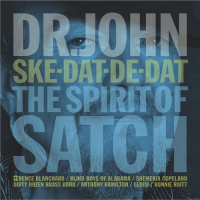
A few weeks ago, I was in a car heading across the longest continuous bridge over water in the world. It takes about 25 minutes driving at 60 mph to cross Louisiana's Lake Pontchartrain on the Causeway. There's a point on that bridge where you can't see New Orleans behind you, bayou country in front of you or land on either side. That's one massive lake, leaving you feeling as though you were driving to Europe. I was on my way to the home of Mac Rebennack, better known as Dr. John, the Night Tripper.
When I arrived at Mac's house in St. Tammany Parish, he was in the living room, and we talked a bit about his new album, Ske-Dat-De-Dat: The Spirit of Satch, a tribute to Louis Armstrong. Then Mac invited me outside. “Come on, let's sit on the patio. I can have my cigar out there." As we settled in and Mac lit up, I looked warily at the dense woodlands nearby, wondering how many gators were in there thinking about lunch. I was there on assignment for The Wall Street Journal for a profile on rock's wild card.
Now I've heard some pretty hip talkers in my time, but Mac is up there with the best of them. Virtually everything he says is in a patios of his own making, marinated in New Orleans creole and R&B culture. I transcribed a bit from my recorded interview:
“I've always gravitated to people who are true characters—not jive ones. They are the woo to me—special and a half. Back in the game, so many great musicians were totally off the hook, you never knew what they were liable to say or do. Everything was unexpected, including the music, and that was oaks and herbs to me."
I would add that Mac pronounces characters as “cah-rack-tuhs" while Louis Armstrong's first name is said formally as Louis, not “Louie." While the New Orleans pianist has long been admired by everyone who's anyone in the mainstream music business, he is pure voodoo and blues, winning all six of his Grammys for blues recordings. Like New Orleans itself, Mac is marinated in the city's nocturnal humidity, cracked plaster and larger-than-life hustlers and their angles. But as plugged into contemporary music as Mac is, his true love is jazz—particularly boogie-woogie and stride. In the '60s, Mac was booked by Joe Glaser, Louis Armstrong's manager, and Mac met Armstrong once at Glaser's office.
Mac and I spent the first 45 minutes together outside talking about his career. Eventually we zeroed in on jazz and his years in Los Angeles in the 1960s, when he played with many jazz musicians in the clubs and studios. Mac was often brought in for piano flavoring. As Mac smoked and talked, he occasionally would forget the last name of a musician. I helped out. “Conte...?," Mac said, struggling to remember the last name. Candoli? “Right, right. Well, he brought this trombonist..." Frank Rosolino? “Right! Right! And then Plas Johnson came in with Conte's brother...." Pete? Mac's eyes twinkled.
With his cigar done and Mac comfortable, he suggested we return inside, and for the next half hour he played his glossy black baby-grand piano, covering a wide range of New Orleans piano styles pioneered by Jelly Roll Morton, Professor Longhair, Champion Jack Dupree, Huey Smith and Fats Domino. He even played and sang Morton's I Thought I Heard Buddy Bolden Say. As you can imagine, his performance left me speechless, especially given my seat at the piano's side.
Most people know Dr. John as a Mardi Gras rocker, a loose and funky boogie-woogie practitioner, and a colorful piano raconteur who can work the keys in any genre. But in truth, he's a piano historian and deeply partial to piano players who tell two stories at once on the piano—one with each hand.
To read my Wall Street Journal profile of Dr. John in today's paper, go here.
JazzWax tracks: You'll find Dr. John's new album,Ske-Dat-De-Dat: The Spirit of Satch (Concord) here.
JazzWax clips: Here's Dr. John solo in 1981 playing and singing his hit Such a Night...
Here's Dr. John and Harry Connick Jr. in 1989 playing Do You Know What It Means to Miss New Orleans...
Here's Dr. John and Eric Clapton, with Ronnie Cuber on baritone sax, in 1996 playing Dr. John's Right Place, Wrong Time...
“I've always gravitated to people who are true characters—not jive ones. They are the woo to me—special and a half. Back in the game, so many great musicians were totally off the hook, you never knew what they were liable to say or do. Everything was unexpected, including the music, and that was oaks and herbs to me."
To read my Wall Street Journal profile of Dr. John in today's paper, go here.
JazzWax tracks: You'll find Dr. John's new album,
JazzWax clips: Here's Dr. John solo in 1981 playing and singing his hit Such a Night...
Here's Dr. John and Harry Connick Jr. in 1989 playing Do You Know What It Means to Miss New Orleans...
Here's Dr. John and Eric Clapton, with Ronnie Cuber on baritone sax, in 1996 playing Dr. John's Right Place, Wrong Time...
This story appears courtesy of JazzWax by Marc Myers.
Copyright © 2024. All rights reserved.



























